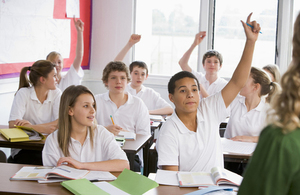Pupil Premium Awards finalists announced
All 21 finalists have shown how they effectively used the pupil premium to help disadvantaged young people reach their potential.

The final shortlist of schools which have most effectively used the pupil premium to improve the life chances of disadvantaged pupils was announced today (22 April 2016).
A total of 21 schools across the country have been named as finalists in this year’s prestigious Pupil Premium Awards, with an awards ceremony in London next month (May) to celebrate their achievements.
The finalists have consistently shown high levels of attainment or significant rates of improvement among their disadvantaged pupils over time and demonstrated innovative and effective use of the pupil premium.
The pupil premium - worth £2.5 billion this year - has enabled schools to provide vital support to some of the most vulnerable children in their care. Figures show the attainment gap between disadvantaged pupils and their peers has narrowed since 2011, the year the pupil premium was introduced.
Minister for Childcare and Education Sam Gyimah said:
I would like to congratulate the finalists of this year’s awards who, through their creative use of the pupil premium, have each shown the impact that this funding and the dedication of teachers can have on improving the life chances of the next generation.
While we know that the attainment gap between disadvantaged pupils and their classmates has narrowed at both primary and secondary level, we want to go further, and I urge more schools to follow the example set by these finalists.
This year’s judging panel was made up of outstanding headteachers, including former award winners, and chaired by respected education expert Andreas Schleicher, Director of Education and Skills at the OECD. Renowned contemporary artist Tracey Emin will present the awards at the ceremony.
For the first time, the awards have been sponsored by a wide range of highly regarded organisations from the arts, culture, science and technology sectors, which will provide award-winning schools with exciting and culturally enriching opportunities to both their pupils and teachers.
All of the finalists have shown an impressive level of innovation - some schools have chosen very personalised interventions, others a more whole-school approach - but all have set high expectations for their pupils and teachers.
Further information
The pupil premium is worth up to £1,900 per child and can be used however schools see fit to close the attainment gap between disadvantaged pupils and their peers.
The government has committed to maintaining the funding throughout this Parliament. Since April 2011, around £6.23 billion has been given to schools to improve the attainment of disadvantaged pupils.
Attainment has risen in the latest year and our new measure shows the attainment gap between disadvantaged pupils and their peers has narrowed since 2011 - the year the pupil premium was introduced - by 7.1% at key stage 2 and 6.6% at key stage 4.
In the national awards, there will be winners in 4 categories:
- key stage 2
- key stage 4
- special schools and alternative provision
- key stage 1 and 3
The finalists
Key stage 2
Norbridge Academy (East Midlands)
Camp Primary & Nursery School (East of England)
Edward Pauling Primary School (London)
Northern Saints C of E Primary School (North East)
Lower Kersal Community Primary School (North West)
Blean Primary School (South East)
Ernesettle Community School (South West)
Tinsley Meadows (Yorkshire and Humber)
Key stage 4
Caroline Chisholm (East Midlands)
St Albans Girls’ School (East of England)
La Retraite RC School (London)
St Wilfrid’s RC College (North East)
Ripley St Thomas (North West)
Maiden Erlegh School (South East)
Great Torrington (South West)
Selly Park (West Midlands)
Healing Science Academy (Yorkshire and Humber)
Infant, first and key stage 3 schools
Greenfylde C of E First School (South West)
Hillcrest Early Years Academy (East Midlands)
Special and alternative provision schools
The Link School (North East)
Park Campus Academy (London)
DfE media enquiries
Central newsdesk - for journalists 020 7783 8300